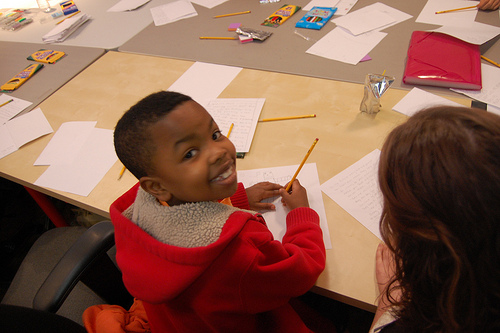Aidan loved school through fourth grade. But once he started fifth grade, his parents observed that he often reported feeling sick in the morning before school. He made many negative comments about himself, often related to his abilities at school, stating, “I’m stupid” or “I can’t do this, it’s too hard.” His teacher reported that he was inconsistent in school, sometimes getting right to his work while at others putting his head down on his desk and needing prompts to begin tasks. His parents saw just the old Aidan on weekends at home, playing enthusiastically with his neighborhood friends and talking with everyone he saw. But on school nights he began to display emotional outbursts, particularly when he had to do handwriting assignments. He was frustrated with fifth grade work, where writing requirements were not just to copy vocabulary words but also to write comments about his reading and to write brief essays.
When asked Aidan was able to tell his parents about the assignments and what he needed to do, but he struggled to get his thoughts onto paper. His parents asked his teacher if they could scribe for him, having him talk to them about what he wanted to say and they would type it. His teacher was agreeable but suggested that Aidan would benefit more by learning dictation skills so that he could do this on his own while he was thinking about his work. She suggested that he work with the school psychologist, who was training kids with writing and processing-speed issues to learn how to use dictation to improve their writing. After a six-week training session Aidan was using dictation to complete his homework assignments. His teacher also allowed him to use dictation in the classroom when he was able to find a quiet space to work. Within a few months he was using his dictation skills for almost all of his writing assignments, no longer making negative comments about himself and breezing through his homework.
Aidan is not alone. Writing is a frustrating experience for many students. Many of these children have always struggled with putting things onto paper. They may not have liked to color in preschool and had trouble learning to write their names, even if they were good readers and spellers. Some of these kids have problems with fine-motor skills. Problems with getting their thoughts onto paper could also be related to issues with working memory or slow processing speed. As a result, writing can become a task to be avoided as much as possible.
Writing is a complex task that requires more skills than virtually any other subject that kids learn in elementary school. For example, reading necessitates phonological skills, attention, working memory, an adequate vocabulary, and fluency. But the first requirement of writing is the ability to read, then a multitude of other skills, including fine-motor capacities, flexibility, creativity, time management, and organization. Many of these skills need to be taught and practiced. For children who are extremely frustrated with just getting their thoughts and words onto paper, I suggest we consider using assistive technologies to help them in this area.
Technology is a great tool for kids with learning, attention, and executive-functioning issues. It can level the playing field for kids who have difficulty with memory, organization, and writing skills. But most children would require help and direction in using technologies in this regard, especially those who have great ideas but also difficulty with written language, struggle to get their thoughts onto paper, or display a slow pace of written work. It would be too easy just to tell students that they need to use a diction app and think that they could overcome their struggles with writing.
Many kids with writing issues also need help with academic and executive-functioning skills. However, if we train them with appropriate technologies, they may have more cognitive resources available to learn these skills. Children for whom the physical process of writing is cumbersome and slow may forget what they wanted to write due to difficulty with working memory and processing speed. They may write illegibly and therefore be unable to edit their work and may frequently take so long to complete assignments that they either rush through them or make them very brief.
Our team at LearningWorks for Kids believes that teaching kids the executive skills needed for writing is crucial for many children with ADHD, Learning Disabilities, Autism Spectrum Disorder, and weakness in executive functioning. Children are often very responsive to learning these skills when they can use technology to help them. We conduct training sessions on a variety of topics, including the use of dictation skills for kids.
Here are some of the reasons that all students, particularly those with ADHD, Learning Disabilities, Autism Spectrum Disorder, and weakness in executive functioning, should learn dictation skills:
- It’s the twenty-first century, they need to talk to Alexa, Siri, and Google Assistant.
- It’s faster than handwriting or typing.
- It’s getting more accurate. This is true for the basic programs on smartphones and even more so on adaptive tools such as Dragon Anywhere.
- It helps to overcome issues with executive functioning such as time management, working memory, task initiation, and sustained focus.
- It helps with note taking and texting.
- It is a safety issue, such as being hands free for older kids who are driving.
- It can help with organization of notes, calendars, and keeping track of assignments.
- It can overcome spelling errors, providing correct spelling for kids who speak clearly while dictating.
- It can be an enormous, life-changing tool for kids who struggle with writing issues in school.
To learn more about how you can involve your child in a fun, engaging, and effective program to learn dictation skills contact LW4K.






My name is Greg. I have a child on the spectrum. I am also a special education teacher. I think dictation is the route to go for my son who is in 2nd grade. I also think that for many of the kids I teach at, their age level (4-6 grade), they need something like.
Hello being a father I think that Dictation is totally different from writing, Being a father I wish that my child should be efficient in both field. and I am also requesting to all teachers that you should focus on both. thank you
Pat Wolfe, EdD, educational adviser, former teacher, and author of The Building Brain, found that most children had difficulty reading when they were in kindergarten.